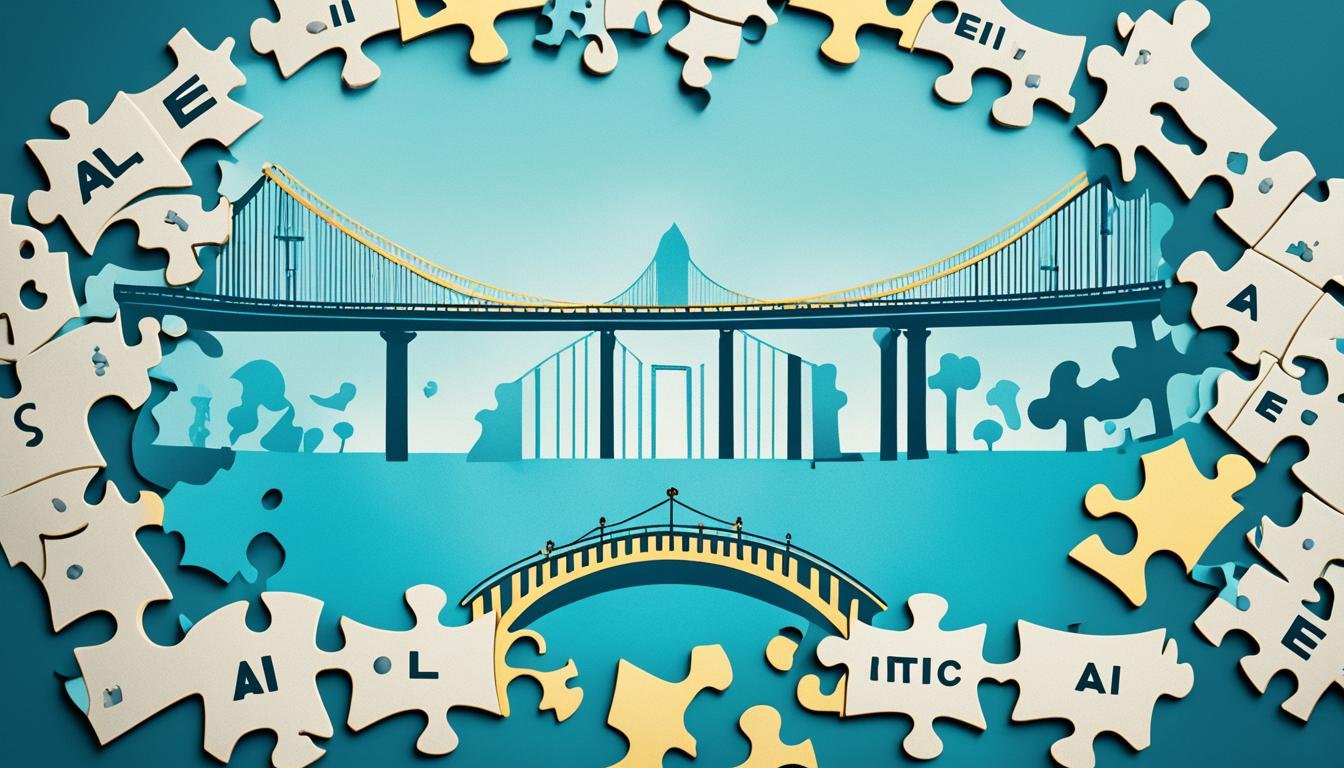Artificial intelligence (AI) is now a big part of our lives, touching everything from healthcare to online shopping. But as AI gets more complex, we see the need for ethical rules more clearly. Researchers have been working on this for over 20 years, showing how important it is.
AI ethics are the rules that guide how companies make and use AI responsibly. They help make sure AI respects human rights and doesn’t cause harm. As AI gets more advanced, more people, including big tech and governments, are talking about these ethics.
Creating ethical AI rules means companies and groups must work together. They need to think about how AI affects society and how humans and machines can work together well. This teamwork is key as we deal with the good and bad sides of AI.
Key Takeaways
- The need for ethical AI development has been a focus for researchers for over two decades.
- AI ethics aim to ensure AI systems respect human rights, promote social justice, and mitigate potential harm.
- Discussions around AI ethics have expanded from academia to involve tech companies and governments.
- Developing ethical AI principles requires collaboration to address the complex intersections of AI with social, economic, and political issues.
- Responsible AI development is crucial as the potential for both immense benefit and significant harm coexist with AI technologies.
Introduction to AI Ethics
AI technology is getting more common in our lives. This makes it vital to have strong ethical rules for its use. These rules help everyone, from tech experts to government officials, make sure AI is used right. It’s about making AI safe, secure, kind, and good for the planet.
What are AI Ethics?
AI ethics cover many things. They focus on avoiding bias, keeping user data safe, and reducing harm to the environment. They also push for clear and honest AI decisions. A good AI ethics code helps people and groups deal with the tricky parts of AI.
Importance of AI Ethics
AI ethics are very important because AI can change or help human thinking. If AI has the same flaws as humans, it could make biased or wrong decisions. This could hurt certain groups of people. By following ethical rules, we make sure AI helps everyone fairly and safely.
As AI gets more popular, we must think about what are ai ethics, importance of ai ethics, ai transparency and accountability, and ai privacy and security. This ensures AI is used in a way that’s right and fair.
“The rise of customer-centricity and social activism has coincided with the rapid acceleration in AI adoption across businesses. As a result, the need for clear guidelines and principles for ethical AI has become increasingly important.”
– Sudhir Jha, CEO and Executive Vice President at Mastercard’s Bridgerton unit
| Key Principles of Ethical AI | Description |
|---|---|
| Inclusivity | Ensuring AI systems are designed to be inclusive and fair, without discrimination based on race, gender, or other factors. |
| Explainability | Making AI decision-making processes transparent and understandable, allowing for accountability and trust. |
| Positive Purpose | Developing AI with the intention of creating societal benefit and minimizing potential harm. |
| Responsible Data Usage | Protecting user privacy and security by carefully managing the collection, use, and storage of personal data. |
Stakeholders in AI Ethics
Creating ethical AI rules needs everyone in the industry to work together. Academics shape the research and theory. Governments and intergovernmental groups set the rules. Each group is key to keeping AI ethics strong.
Role of Academics
Academics focus on developing theories and research. They help governments, companies, and non-profits make ethical AI a reality. Their work covers AI bias, privacy, and environmental impact, guiding how AI is used in real life.
Role of Governments
Governments play a big part in making AI ethics a reality. For example, the US’s Preparing for the Future of Artificial Intelligence report helps guide AI use. They set rules and incentives to encourage ethical AI development and use.
Role of Intergovernmental Entities
Groups like the United Nations and the World Bank focus on spreading the word about AI ethics worldwide. UNESCO’s global agreement on AI ethics sets common rules for using this powerful tech responsibly.
Role of Non-Profit Organizations
Non-profits make sure different groups have a say in AI tech. They create guidelines like the Asilomar AI Principles. They’re key in pushing for inclusive AI and making sure all communities have a say in AI ethics.
Role of Private Companies
Companies, big and small, have ethics teams and codes to follow. They set the standards for ethical AI development. By putting responsible AI principles into action, they build trust and reduce risks.
Working together, these groups can create a strong and effective AI ethics framework. This way, AI’s power can benefit everyone.

Challenges of Unethical AI
Artificial intelligence (AI) is getting more common in our lives. It’s important to tackle the problems unethical AI brings. These problems include AI bias, privacy issues, and the harm to the environment from making and using AI.
AI Bias and Discrimination
AI can be biased and discriminate. This happens because AI systems learn from data that might not show everyone’s diversity. For instance, Amazon’s AI tool once scored resumes lower if they mentioned “women,” showing gender bias in the data.
AI Privacy Concerns
AI also raises big privacy questions. Companies can collect a lot of personal data for AI without really asking people if it’s okay. This was seen with Lensa AI, which used online images for portraits without permission, making people worry about their data.
Environmental Impact of AI
Training complex AI models uses a lot of energy, which is bad for the environment. It leads to more greenhouse gases and uses up natural resources. We need to find ways to make AI less harmful to the planet.
| Challenges of Unethical AI | Key Insights |
|---|---|
| AI Bias and Discrimination | AI systems can perpetuate biases and discriminate against certain groups due to flaws in training data and algorithm design. |
| AI Privacy Concerns | Companies can access and use personal data to train AI models without proper user consent, raising privacy issues. |
| Environmental Impact of AI | The energy-intensive nature of AI development and deployment can have a significant environmental impact, contributing to greenhouse gas emissions and resource strain. |
We need to work on these issues to make sure AI is used in a good way. This way, we can enjoy AI’s benefits without the bad effects of using it wrongly.
why do we need ethics in ai
Artificial Intelligence (AI) is changing our world fast. But with its power comes big responsibility. As AI becomes more common in our lives, we must think about ethics more. We need to make sure AI helps everyone, not just some.
One big reason for AI ethics is avoiding biased or wrong algorithms. AI learns from data that might show our biases. If we don’t fix this, AI can make things worse for some people. Ethical AI helps prevent this and makes sure AI is fair for everyone.
AI also needs to protect our privacy and data rights. AI uses a lot of personal data to work. We worry about how this data is handled. Ethical rules can set limits to keep our data safe and private.

AI’s effect on the environment is also important. Training big AI models uses a lot of energy, which harms the planet. We need to make AI more eco-friendly to protect our environment.
In short, ethics in AI is a must. By adding ethical rules to AI, we can make sure it helps everyone. As we improve AI, we must always think about fairness, privacy, and the planet.
Real-World Examples of AI Ethics Issues
AI systems are becoming a big part of our lives. This has brought up ethical concerns that need careful thought. The Lensa AI app and the use of ChatGPT in schools show how complex AI ethics can be.
Lensa AI and Artist Consent
The Lensa AI app makes profile photos from your own pictures using AI. But, it didn’t pay or give credit to the artists whose work it used. This raises big questions about using art without permission or fair pay. It shows AI makers must think about the rights of artists and others whose work trains these systems.
ChatGPT and Academic Integrity
ChatGPT, made by OpenAI, can talk like a human and write text. But, it’s causing problems in schools. Students are using it to cheat on work and even write whole essays. This shows how AI can hurt academic honesty. We need clear rules to make sure AI is used right in schools.
These examples show the big challenges we face with AI ethics. They tell us we need to keep talking and making policies. We must make sure AI is developed and used in a way that’s right for everyone.
“The advancement of artificial intelligence has brought about both exciting possibilities and concerning ethical challenges. As we continue to integrate AI into our lives, it is crucial that we prioritize responsible development and consider the far-reaching implications of these technologies.”
Governing AI Ethics
As AI technologies get better, we need strong rules and good education on AI ethics more than ever. It’s important to balance innovation with protecting society. Governments are starting to make rules for ethical AI use and development.
Regulatory Frameworks
Rules for governing ai ethics help make sure AI is used right and responsibly. Some key examples include:
- The European Union’s General Data Protection Regulation (GDPR), which has rules for AI. It makes sure companies are clear about how they use personal data and get consent.
- The IEEE’s Ethically Aligned Design (EAD) guidelines, which help design AI systems that match human values. They focus on privacy, being clear, and being accountable.
- The National Institute of Standards and Technology (NIST) guidelines for responsible ai ethics education in the financial sector.
- The Federal Aviation Administration (FAA) guidelines for safe and ethical drone use.
- The California Artificial Intelligence Video Interview Fairness Act, a rule about AI in job interviews in California.
As regulatory frameworks for ai ethics change, it’s important for everyone to keep up. This includes policymakers, business leaders, and the public. They need to help shape these rules to deal with AI’s ethical issues.
AI Ethics Education
Teaching people about ai ethics is key to managing AI. It helps people understand the risks and make better choices. Courses, training, and awareness campaigns can help reduce the bad effects of AI.
Good ai ethics education should include topics like:
- Basic AI ethics principles, like being clear, accountable, and fair
- The big picture of AI’s effects on society, the environment, and the economy
- How to make ethical AI, including testing, reviews, and a company culture that cares about ethics
- Laws, rules, and guidelines for AI use
By focusing on governing ai ethics with strong rules and education, we can make sure AI helps society. This is how policymakers, business leaders, and the public can work together for the good of all.
Ethical AI Development
Creating ethical artificial intelligence (AI) needs a detailed plan. It’s important to focus on avoiding biased data, making AI models clear, and thinking about the environment. These steps help organizations use AI safely and make the most of its benefits.
Avoiding Biased Data
One big challenge is algorithmic bias. This happens when AI learns from data that’s not diverse or has biases. To fix this, companies must check their data sources. They should make sure the data is diverse and unbiased. Using strong data rules and working with different people can help spot and fix biases early on.
Transparent AI Models
Transparency is key in ethical AI. AI models that explain their choices build trust and help people understand how they work. This can be done with clear algorithms and openly sharing model limits. Transparent AI lets users make better choices and keeps developers responsible for their work.
Environmental Considerations
As AI gets more popular, we must think about its effect on the planet. Training and running AI can use a lot of energy and harm the environment. To be ethical, AI development should focus on reducing its environmental impact. This means using less energy, choosing renewable energy, and deploying AI responsibly. This way, AI can help without hurting the planet.
By focusing on ethics in AI, companies can use this technology for good. They’ll make sure AI is open, fair, and good for the environment. This approach is key to making AI a positive change in our future.
Benefits of Ethical AI
Using ethical principles in AI development brings big benefits to society. It focuses on fairness, transparency, and accountability. This makes people trust the technology more and ensures it helps everyone, not just some.
Ethical AI reduces risks and potential harm. It protects user privacy and fights bias and discrimination. This is key in today’s world of big data and automated decisions. It makes society more inclusive and fair for AI use.
Adding ethical thoughts to AI makes it more responsible and useful. For example, self-driving cars with ethical AI could save about 40,000 lives a year in the U.S. by cutting down on accidents from human mistakes.
Ethical AI also helps democracy by making it stronger. AI can stop fake news, protect against cyber threats, and keep data accurate. This shows how important ethical AI is for a healthy society.
Ethical AI has big benefits for society. By following these principles, we can use AI’s power for everyone’s good. This leads to a fairer and better future for all.

| Benefit | Description |
|---|---|
| Increased Trust in AI | Ethical AI promotes fairness, transparency, and accountability, helping to build public trust in the technology. |
| Mitigating Risks and Harms | Ethical AI systems are designed to protect user privacy and safeguard against bias and discrimination. |
| Responsible and Beneficial Applications | Ethical considerations in AI development can lead to more responsible and beneficial applications, such as in self-driving cars. |
| Strengthening Democratic Institutions | Ethical AI can help prevent the spread of disinformation, protect against cyber attacks, and maintain data quality for a robust democratic system. |
Challenges in Implementing AI Ethics
As ethical AI becomes more important, companies face big challenges in making these ethics real. One big issue is balancing innovation and regulation in AI. If rules are too strict, they can slow down new tech. But if they’re too loose, AI could be used in bad ways. Finding the right balance is hard and needs careful thought on how AI affects society.
Another big challenge is differing cultural values and perspectives on the role of technology. AI ethics matters worldwide, but what people think about it varies a lot. Getting everyone to agree on how to use AI ethically is tough. It requires understanding different views and finding common ground.
- Opacity and lack of transparency in AI systems can hinder accountability and responsible development.
- Algorithmic biases and unintended discrimination pose ethical risks that must be proactively addressed.
- Ensuring data privacy and security in an AI-driven world is crucial, yet increasingly challenging.
As AI becomes more common, companies must stay alert to ethical issues. Talking openly, working together across industries and cultures, and focusing on responsible innovation can help. This way, AI can help us while respecting our values and principles.
| Challenge | Description |
|---|---|
| Balancing Innovation and Regulation | Striking a balance between fostering technological progress and implementing necessary regulations to ensure ethical AI development. |
| Differing Cultural Values | Navigating diverse cultural norms, philosophical beliefs, and political ideologies to reach a global consensus on AI ethics standards. |
| Algorithmic Bias and Discrimination | Addressing the ethical risks posed by biases and unintended discrimination in AI systems. |
| Data Privacy and Security | Ensuring the protection of personal data and privacy amidst the increasing prevalence of AI-driven applications. |
“The challenge of AI ethics is not just about creating the right rules and regulations, but about navigating the complex intersection of technology, culture, and human values.”
AI Ethics in Science Fiction
Science fiction has always been great at showing us the good and bad sides of artificial intelligence (AI). Movies like “Her” and books like “I, Robot” make us think about how AI might change our lives and society.
In “Klara and the Sun” by Kazuo Ishiguro, we see a future where AI takes over jobs and rich parents choose genetic upgrades for their kids. The story talks about how AI, like Klara, an “Artificial Friend,” is treated badly. It makes us wonder about the rights and dignity of AI and how society treats them.
Isaac Asimov’s “I, Robot” from 1950 also looks at AI ethics. It introduces the “Three Laws of Robotics” to guide robots. These laws show the tricky parts of making smart machines behave right. Asimov’s ideas are still important today, with new AI like GPT-4 and MidjourneyV5 showing how AI is becoming a bigger part of our lives.
Science fiction stories like these do more than just entertain. They make us think about the right way to interact with AI. They make us question what being human means and our duties in making AI ethics. As AI gets more into our lives, stories like these help us understand and think about the ethics of this new technology.

“The central concern of Klara and the Sun is how we treat AI, how we relate to it, and what it means to be human in a world where AI is becoming increasingly sophisticated and integrated into our lives.” – Kazuo Ishiguro
Future of AI Ethics
The future of ai ethics is shaping up, and we see the big role of ai governance and regulation more clearly. As AI changes many parts of our lives, we need strong ethical rules and oversight more than ever.
Governments, international groups, and companies must work together. They need to make comprehensive regulatory frameworks for AI. These rules should cover ethical issues like bias and discrimination, privacy concerns, and environmental impact.
Teaching people and the next generations about AI’s ethics is key. As AI becomes a bigger part of our lives, we all need to know the risks and effects it can have. AI ethics education will help make sure AI is used right and for good.
The future of ai ethics will rely on everyone working together. This includes governments, experts, non-profits, and companies. By focusing on ethics and working on strong ai governance and regulation, we can make the most of AI. And we can protect our society at the same time.
| Key Considerations for the Future of AI Ethics | Stakeholder Roles |
|---|---|
|
|
“Responsibility must be clarified regarding the consequences of AI-based decisions that lead to adverse outcomes.”
– Adam Wisniewski, CTO and co-founder of AI Clearing
Conclusion
The need for ethical AI is clear. AI can change our world for the better, but we must be careful. By working together and setting rules, we can make sure AI helps society.
AI’s future is in our hands. We must tackle issues like bias and privacy. We also need to think about how AI will change in the future. Ethics in AI is crucial for its success and for our values.
As AI gets more advanced, we’ll need strong ethics and teamwork. Let’s be careful and work together. This way, AI will improve our lives, not make them worse.
FAQ
What are AI Ethics?
AI ethics are the moral rules that guide how companies make and use AI technology. These rules make sure AI is safe, fair, and good for the planet.
Why are AI Ethics important?
AI ethics matter because AI can change or help human thinking. If AI has bias or errors, it can hurt certain groups of people. This is a big problem.
Who are the key stakeholders in AI Ethics?
Important people in AI ethics include experts, governments, groups that work together, non-profits, and companies. They all help make ethical rules, spread awareness, and ensure AI is used right.
What are some challenges of unethical AI?
Unethical AI faces issues like bias, privacy worries, and harm to the environment. For example, AI tools for hiring have shown gender bias. AI models like Lensa have raised questions about artist consent and how data is used.
How can we promote more ethical AI?
We can push for ethical AI by making laws, teaching people, making AI clear and fair, and thinking about the environment when making AI.
What are the benefits of ethical AI?
Ethical AI makes things fair, clear, and responsible. It builds trust in the tech and helps everyone, not just some. It also lowers risks and protects privacy, fighting bias and discrimination.
What are the challenges in implementing AI ethics?
Challenges include finding the right balance between new tech and rules, and understanding different cultures’ views on technology. Agreeing on AI ethics can be hard because of these complex issues.
How has science fiction explored the ethical implications of AI?
Science fiction has shown us the good and bad sides of AI. It makes us think about how AI could change human relationships and what being “human” means. This makes us think carefully about AI technology.
What is the future of AI ethics?
As AI gets more into our lives, AI ethics will become more important. Governments, groups, and companies must work together to make strong rules and ethical standards. This will help make sure AI is used right and helps everyone.
